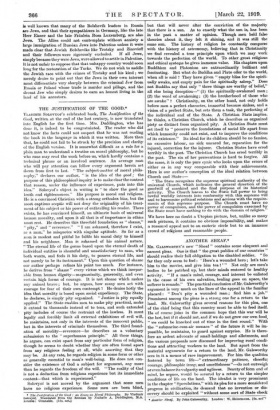ANOTHER SHEAF.* Ma. Gax,swonrirr's new " Sheaf " contains some
eloquent and earnest pleas. One is that "the great publics of our countries" should realize their full obligation to the disabled soldier. "Sc far they only seem to feel Here's a wounded hero ; let's take him to the movies, and give him tea I ' " Not only are men's bodies to be patched up, but their minds restored to healthy activity. "If a man's mind, courage, and interest be enlisted in the cause of his own salvation, healing goes on apace, the sufferer is remade." The practical conclusion of Mr. Galsworthy's argument is very much on the lines of the appeal in the familiar placard : "Don't pity a wounded man ; find him a job." Prominent among the pleas is a strong one for a return to the land. Mr. Galsworthy gives several reasons for this plea, one of the chief being that this country must be able to feed itself. He of course joins in the common hope that this war will be the last, but if it should not, and if we do not grow our own food, "we could be knocked out of time in the first round." With the " subraarine-cum-air menace" of the future it will be ins. possible, he maintains, to guard against surprise. He is there- fore an ardent advocate of small-holdings and allotments, and the various proposals now discussed for improving rural condi- tions and attracting workers to the land. But apart from the material arguments for a return to the land, Mr. Galsworthy sees in it a means of race improvement. For him the qualities fostered by town life—" extraordinary patience, cheerful courage, philosophic irony, and unselfishness "—do not outweigh or even balance its vulgarity and ugliness. Beauty of form and of mind, he argues, would be secured by a return to the simpler conditions of life on the land. The idealist is very prosninent in the chapter "Speculations," with its plea foes more considered progress in civilization, its demand that no invention or dis- covery should be exploited "without some sort of State check
• Another Sheaf. By John Galaworthy. London: W. Heinemann. Ms. net,
In the interests of health, beauty, and happiness," its denuncia- tion of the modern tendency to vulgarity, and its plea that the sim of mankind should be "to do our jobs really well and to be brotherly I To seek health and ensue beauty I " From Mr. Galsworthy's satirical sketch of social conditions in 1947 it would almost seem as if he had little faith in even an approximation to the ideals for which he pleads earlier in the book. Twenty-eight years hence the Angel Acthareal on .a flying visit to Britain finds vulgarity as rampant and Britons as ugly as Mr. Galsworthy finds them to-day—and the rural population is represented by one man, "the sole survivor of the soldiers settled on the land at the conclusion of the Great Skirmish " ! Among other papers in the new "Sheaf" are comparative studies of "Englishman and Russian" and "American and Briton " ; and some interesting reflections on "Anglo-American Drama and its Future."



































 Previous page
Previous page